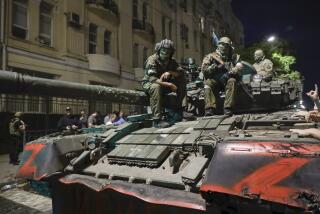Warriors Against Fascism Reunite in Madrid
- Share via
MADRID — George Sossenko was a 16-year-old boy in Paris when he left a note for his mother and ran off to fight in the Spanish Civil War.
“I know this will cause you pain,” he wrote, “but the future of the world is being played out in Spain.” Sossenko and about 35 of his former comrades in arms came together in Madrid on Monday to mark the 70th anniversary of the start of the war triggered when Gen. Francisco Franco rebelled against Spain’s elected government.
They formed part of the International Brigades, about 35,000 men and women from more than 50 countries who journeyed to Spain to fight fascism, an ultimately losing battle that is often regarded as the precursor to World War II.
The warriors are in wheelchairs now. Or they use canes and move slowly.
Their ceremony at parliament in many ways seemed a leftist moment frozen in time: black berets on white hair, feeble shouts of “Viva la republica!” and wobbly raised fists as the socialist anthem “Internationale” was played.
But the men and women said they had a mission beyond just remembering the past: inspiring new generations to fight for democracy and against totalitarianism, a goal they say is as relevant today as it was in 1936.
“Sure, they came to live their memories,” said Sossenko’s wife, Beatrice Bass. “But they also want to pass the torch to young people.”
Monday’s salute, organized by the United Left party, comes as a hotly divided Spanish society struggles with how best to remember the war years and the four decades of Franco dictatorship that followed. The Brigadistas are heroes to many Spaniards and Communist tools to others.
The Brigadistas came to the aid of Spanish Republicans at a time when much of the world refused to help. Franco was backed by Hitler’s Germany and Mussolini’s Italy.
Among those who were paying tribute Monday was Amaya Ibarruri, whose late mother, Dolores, was the legendary war-era Communist leader known by her nom de guerre, La Pasionaria -- the Passion Flower.
“They left behind everything: homes, countries, loved ones, mothers, children, spouses,” Ibarruri said of the International Brigades fighters. “They asked for nothing in return.”
Speaking accented Spanish because she grew up in exile, Ibarruri quoted her mother from a late-1938 farewell to the foreign fighters: “You are history. You are legend. We will never forget you ... and when the olive tree of peace blossoms, return!”
Moe Fishman, 91, who elicited thunderous applause when he urged activists to redouble their protests against the war in Iraq, said that of about 2,800 Americans who fought in the Spanish Civil War, he knows of only 43 who are still alive.
Fishman, of New York City, is the national secretary of the Veterans of the Abraham Lincoln Brigade, the name given the U.S. contingent of the foreign volunteers.
“One reason we wanted to come back was to help the Spanish people recover the memory of what happened,” Fishman said.
Fishman, Sossenko and others said fighting for the Spanish Republic was a searing, sobering experience that left a “wound in our hearts.”
“We matured in Spain, it increased our knowledge and political idealism; it gave us a segunda patria, a second fatherland,” said Sossenko, an octogenarian with a black beret, white goatee and several peace buttons affixed to his tweed jacket. He now lives in Atlanta.
To reach the war, the 16-year-old Sossenko applied first to the Communists and then the Socialists; neither wanted a kid. He then tried the anarchists, where a “red-nosed” recruiter put him on the next convoy to Spain.
“He didn’t even ask my name,” Sossenko recalled.
Handed a rifle and 100 bullets, the boy found himself on the front line in no time. He fought in a critical battle to slow Franco’s march on Madrid; six months later his father tracked him down and persuaded him to return home.
The family fled to Argentina, but Sossenko returned to fight in World War II against the Nazis, ending up eventually attached to the U.S. Army.
He carries photos of himself in a Spanish military uniform and later an American uniform, black-and-white memories tucked into a worn leather wallet.
*
More to Read
Sign up for Essential California
The most important California stories and recommendations in your inbox every morning.
You may occasionally receive promotional content from the Los Angeles Times.














